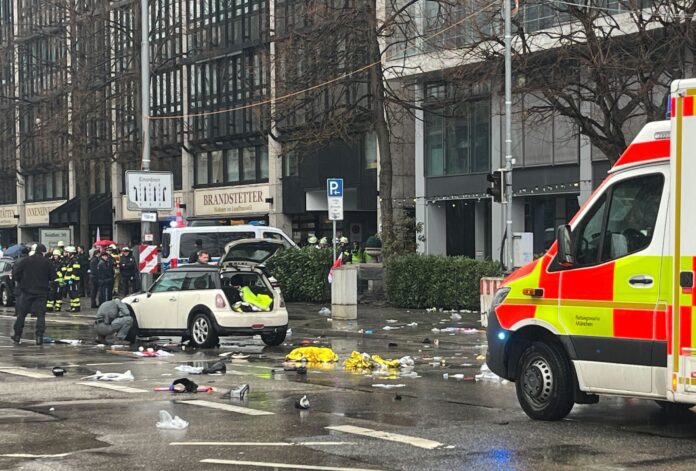The suspected attacker, who has been identified as a 24-year-old Afghan citizen, was quickly captured by police officers who had been accompanying the demonstration near Stiglmaierplatz in central Munich, according to a senior Munich police official, Christian Huber.
Officers fired at least one shot at the suspect before managing to arrest him, according to police and witnesses.
The driver sped past a police vehicle that was accompanying the rear of the demonstration and crashed into the crowd, according to Bavarian Interior Minister Joachim Herrmann.
Some of those struck suffered life-threatening injuries, Herrmann said. Munich mayor Dieter Reiter said he had been informed that children are among those injured. “I am deeply shocked,” Reiter said. “My thoughts are with the injured.”
“A serious attack has taken place in Munich,” said Bavarian state premier Markus Söder in a post on X after visiting the scene of the crash.
Based on reports from police officers accompanying the rally, as well as other witnesses, “we must assume that it was not an accident, but that he acted deliberately”, Hermann said, adding that authorities do not believe that the suspect had accomplices.
He credited police officers who were accompanying the march with reacting quickly to prevent further possible injuries.
Following the attack, police raided a flat in the Munich district of Solln where the suspect is believed to have lived, DPA has learnt.
Police and prosecutors declined to comment on the search.
Sources also told DPA that the suspect is believed to have shared a post online that expressed Islamist views at some point before the attack.
The suspect arrived in Germany in 2016
The 24-year-old asylum seeker from Afghanistan had previously come to the attention of the German police for shoplifting and violations of the Narcotics Act, Herrmann said.
According to information obtained by DPA, the suspect came to Germany as an unaccompanied minor at the end of 2016 and was taken into care by a youth welfare facility. He had previously spent time in Italy.
He filed an application for asylum several weeks after arriving in Germany, which was denied in September 2017, according to DPA’s information.
He appealed against the rejection, but without success, and has been legally required to leave the country since 2020.
He remained in the country, however, under what is known as a “tolerated stay”, a temporary status for foreigners who are legally required to leave Germany but are temporarily permitted to stay under certain circumstances.
This may be the case, for example, if someone has no identity documents, is ill, or has a child who has a valid German residency permit.
Trade union ‘shocked’ by attack
The head of the German trade union Verdi, which had called the demonstration as part of a nationwide two-day strike by public-sector workers amid collective bargaining talks, said the union is “deeply saddened and shocked” by the attack.
“Our thoughts are with the innocent victims and injured, as well as their relatives,” Verdi chairman Frank Werneke said.
The trade union said about 1 000 people had taken part in the Munich demonstration.
According to police, it remains unclear whether the trade union rally was deliberately chosen as the target in the suspected attack or whether the crowd was chosen at random.
“We are stunned that a vehicle was deliberately driven into a peaceful Verdi demonstration and that strikers — including children — were injured, some of them critically,” said the Bavarian state chairman of the German Trade Union Confederation, Bernhard Stiedl.
German politicians vow ‘tough’ response
German Chancellor Olaf Scholz pledged a tough response to the attack, saying on Thursday afternoon that “this perpetrator cannot count on any leniency. He must be punished, and he must leave the country.”
Scholz also expressed his deep sorrow, expressed his thoughts for those injured and their families, and spoke of a “terrible attack”.
“It must be very clear that the judiciary will take tough action against this perpetrator with all the means at its disposal,” said Scholz.
“Anyone who commits crimes in Germany will not only be severely punished and sent to prison but must also expect that they will not be able to continue their stay in Germany.”
The attack immediately resonated in the political campaigns ahead of Germany’s upcoming February 23 election, in which migration policy and issues of attacks that police suspect were committed by asylum seekers have already been a major theme.
German conservative leader Friedrich Merz, the frontrunner to become the next chancellor, swiftly called for stronger security measures in the wake of the suspected attack.
“Everyone in our country must feel safe again. Something has to change in Germany,” the leader of the centre-right Christian Democrats wrote on X.
“The security of the people in Germany will be our top priority. We will rigorously enforce law and order,” Merz added.
German Interior Minister Nancy Faer, meanwhile, vowed “maximum severity” for the suspect and noted that the government has already begun deporting people to Afghanistan despite tense relations with the country’s Taliban regime of hard-line Islamists.
Fallout for Munich Security Conference unclear
Munich is currently preparing for tight security with the Munich Security Conference (MSC), a major gathering of foreign policy experts and global leaders, set to open on Friday.
Hermann said that authorities currently do not believe that there is any connection between the suspected attack and the upcoming conference.
The conference is hosted at the Bayerischer Hof hotel, located in Munich’s city centre about 1.6km away from Stiglmaierplatz, a major square and traffic junction.
US Vice-President JD Vance, Ukrainian President Volodymyr Zelensky, and German Chancellor Olaf Scholz are among the many senior world leaders expected to attend the MSC.
In an initial statement, conference management reacted “with great shock” to the incident but did not comment on any possible consequences for the conference other than saying they are in contact with the police. – dpa



